Education Studies: Social Cohesion, Curriculum & Nation Building in SA
VerifiedAdded on 2023/06/08
|11
|4053
|95
Essay
AI Summary
This essay delves into various aspects of education studies, focusing primarily on the South African context. It begins by comparing and contrasting social cohesion and values, highlighting their importance in education and societal development. The essay then analyzes how schools in South Africa contribute to nation-building by fostering national pride and preparing students for their future roles. It further discusses the main purposes of schooling in South Africa, strategies for explaining the importance of education to illiterate communities, and different types of curricula, drawing from personal experiences to illustrate each type. The essay also outlines the general aims of the South African curriculum as identified by the government and compares schooling during the apartheid and post-apartheid eras. Finally, it explores the nature of knowledge, differentiating between academic and practical knowledge, as well as everyday and specialized knowledge, and discusses the principles of learner-centered teaching. Desklib provides access to this essay and many more resources for students.
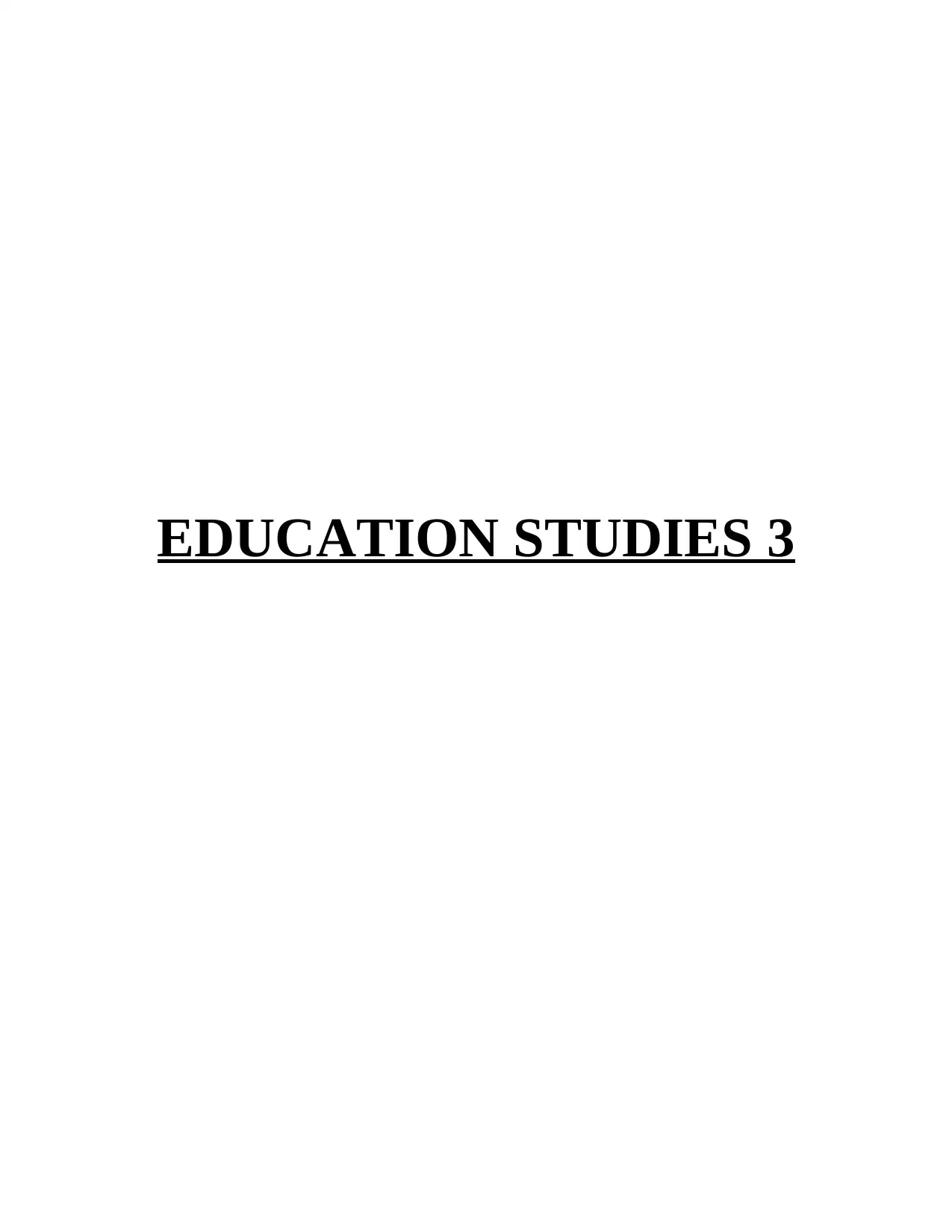
EDUCATION STUDIES 3
Paraphrase This Document
Need a fresh take? Get an instant paraphrase of this document with our AI Paraphraser
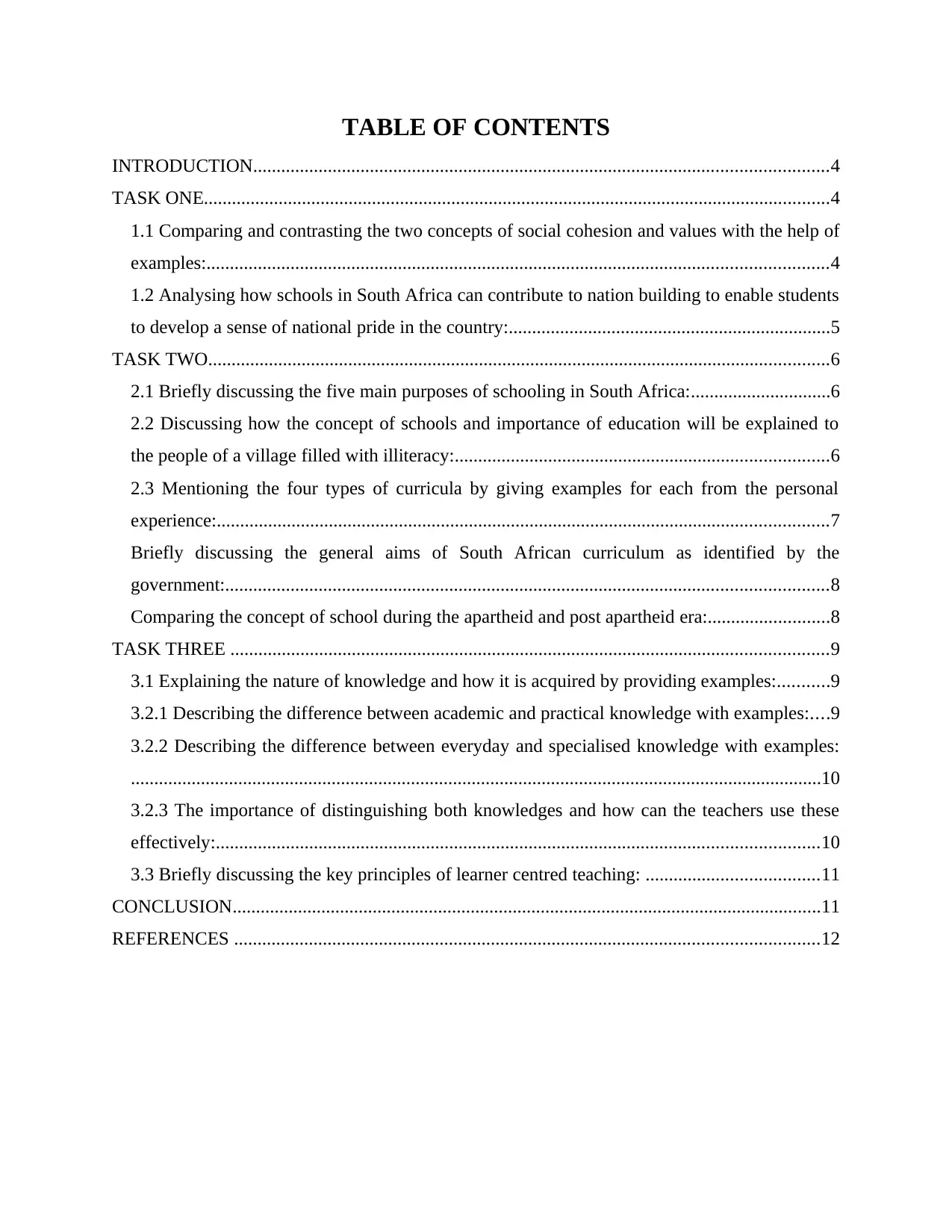
TABLE OF CONTENTS
INTRODUCTION...........................................................................................................................4
TASK ONE......................................................................................................................................4
1.1 Comparing and contrasting the two concepts of social cohesion and values with the help of
examples:.....................................................................................................................................4
1.2 Analysing how schools in South Africa can contribute to nation building to enable students
to develop a sense of national pride in the country:.....................................................................5
TASK TWO.....................................................................................................................................6
2.1 Briefly discussing the five main purposes of schooling in South Africa:..............................6
2.2 Discussing how the concept of schools and importance of education will be explained to
the people of a village filled with illiteracy:................................................................................6
2.3 Mentioning the four types of curricula by giving examples for each from the personal
experience:...................................................................................................................................7
Briefly discussing the general aims of South African curriculum as identified by the
government:.................................................................................................................................8
Comparing the concept of school during the apartheid and post apartheid era:..........................8
TASK THREE ................................................................................................................................9
3.1 Explaining the nature of knowledge and how it is acquired by providing examples:...........9
3.2.1 Describing the difference between academic and practical knowledge with examples:....9
3.2.2 Describing the difference between everyday and specialised knowledge with examples:
....................................................................................................................................................10
3.2.3 The importance of distinguishing both knowledges and how can the teachers use these
effectively:.................................................................................................................................10
3.3 Briefly discussing the key principles of learner centred teaching: .....................................11
CONCLUSION..............................................................................................................................11
REFERENCES .............................................................................................................................12
INTRODUCTION...........................................................................................................................4
TASK ONE......................................................................................................................................4
1.1 Comparing and contrasting the two concepts of social cohesion and values with the help of
examples:.....................................................................................................................................4
1.2 Analysing how schools in South Africa can contribute to nation building to enable students
to develop a sense of national pride in the country:.....................................................................5
TASK TWO.....................................................................................................................................6
2.1 Briefly discussing the five main purposes of schooling in South Africa:..............................6
2.2 Discussing how the concept of schools and importance of education will be explained to
the people of a village filled with illiteracy:................................................................................6
2.3 Mentioning the four types of curricula by giving examples for each from the personal
experience:...................................................................................................................................7
Briefly discussing the general aims of South African curriculum as identified by the
government:.................................................................................................................................8
Comparing the concept of school during the apartheid and post apartheid era:..........................8
TASK THREE ................................................................................................................................9
3.1 Explaining the nature of knowledge and how it is acquired by providing examples:...........9
3.2.1 Describing the difference between academic and practical knowledge with examples:....9
3.2.2 Describing the difference between everyday and specialised knowledge with examples:
....................................................................................................................................................10
3.2.3 The importance of distinguishing both knowledges and how can the teachers use these
effectively:.................................................................................................................................10
3.3 Briefly discussing the key principles of learner centred teaching: .....................................11
CONCLUSION..............................................................................................................................11
REFERENCES .............................................................................................................................12
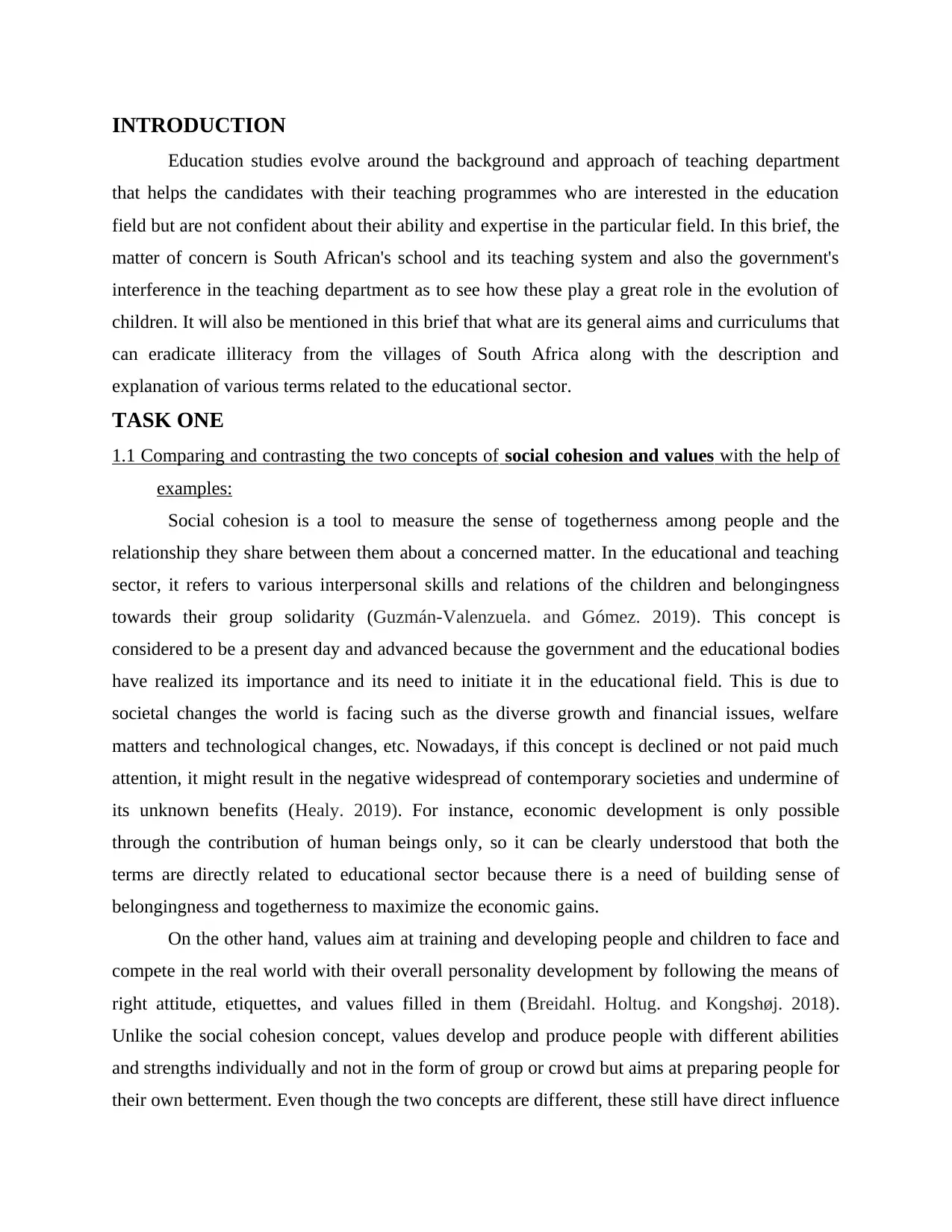
INTRODUCTION
Education studies evolve around the background and approach of teaching department
that helps the candidates with their teaching programmes who are interested in the education
field but are not confident about their ability and expertise in the particular field. In this brief, the
matter of concern is South African's school and its teaching system and also the government's
interference in the teaching department as to see how these play a great role in the evolution of
children. It will also be mentioned in this brief that what are its general aims and curriculums that
can eradicate illiteracy from the villages of South Africa along with the description and
explanation of various terms related to the educational sector.
TASK ONE
1.1 Comparing and contrasting the two concepts of social cohesion and values with the help of
examples:
Social cohesion is a tool to measure the sense of togetherness among people and the
relationship they share between them about a concerned matter. In the educational and teaching
sector, it refers to various interpersonal skills and relations of the children and belongingness
towards their group solidarity (Guzmán-Valenzuela. and Gómez. 2019). This concept is
considered to be a present day and advanced because the government and the educational bodies
have realized its importance and its need to initiate it in the educational field. This is due to
societal changes the world is facing such as the diverse growth and financial issues, welfare
matters and technological changes, etc. Nowadays, if this concept is declined or not paid much
attention, it might result in the negative widespread of contemporary societies and undermine of
its unknown benefits (Healy. 2019). For instance, economic development is only possible
through the contribution of human beings only, so it can be clearly understood that both the
terms are directly related to educational sector because there is a need of building sense of
belongingness and togetherness to maximize the economic gains.
On the other hand, values aim at training and developing people and children to face and
compete in the real world with their overall personality development by following the means of
right attitude, etiquettes, and values filled in them (Breidahl. Holtug. and Kongshøj. 2018).
Unlike the social cohesion concept, values develop and produce people with different abilities
and strengths individually and not in the form of group or crowd but aims at preparing people for
their own betterment. Even though the two concepts are different, these still have direct influence
Education studies evolve around the background and approach of teaching department
that helps the candidates with their teaching programmes who are interested in the education
field but are not confident about their ability and expertise in the particular field. In this brief, the
matter of concern is South African's school and its teaching system and also the government's
interference in the teaching department as to see how these play a great role in the evolution of
children. It will also be mentioned in this brief that what are its general aims and curriculums that
can eradicate illiteracy from the villages of South Africa along with the description and
explanation of various terms related to the educational sector.
TASK ONE
1.1 Comparing and contrasting the two concepts of social cohesion and values with the help of
examples:
Social cohesion is a tool to measure the sense of togetherness among people and the
relationship they share between them about a concerned matter. In the educational and teaching
sector, it refers to various interpersonal skills and relations of the children and belongingness
towards their group solidarity (Guzmán-Valenzuela. and Gómez. 2019). This concept is
considered to be a present day and advanced because the government and the educational bodies
have realized its importance and its need to initiate it in the educational field. This is due to
societal changes the world is facing such as the diverse growth and financial issues, welfare
matters and technological changes, etc. Nowadays, if this concept is declined or not paid much
attention, it might result in the negative widespread of contemporary societies and undermine of
its unknown benefits (Healy. 2019). For instance, economic development is only possible
through the contribution of human beings only, so it can be clearly understood that both the
terms are directly related to educational sector because there is a need of building sense of
belongingness and togetherness to maximize the economic gains.
On the other hand, values aim at training and developing people and children to face and
compete in the real world with their overall personality development by following the means of
right attitude, etiquettes, and values filled in them (Breidahl. Holtug. and Kongshøj. 2018).
Unlike the social cohesion concept, values develop and produce people with different abilities
and strengths individually and not in the form of group or crowd but aims at preparing people for
their own betterment. Even though the two concepts are different, these still have direct influence
⊘ This is a preview!⊘
Do you want full access?
Subscribe today to unlock all pages.

Trusted by 1+ million students worldwide
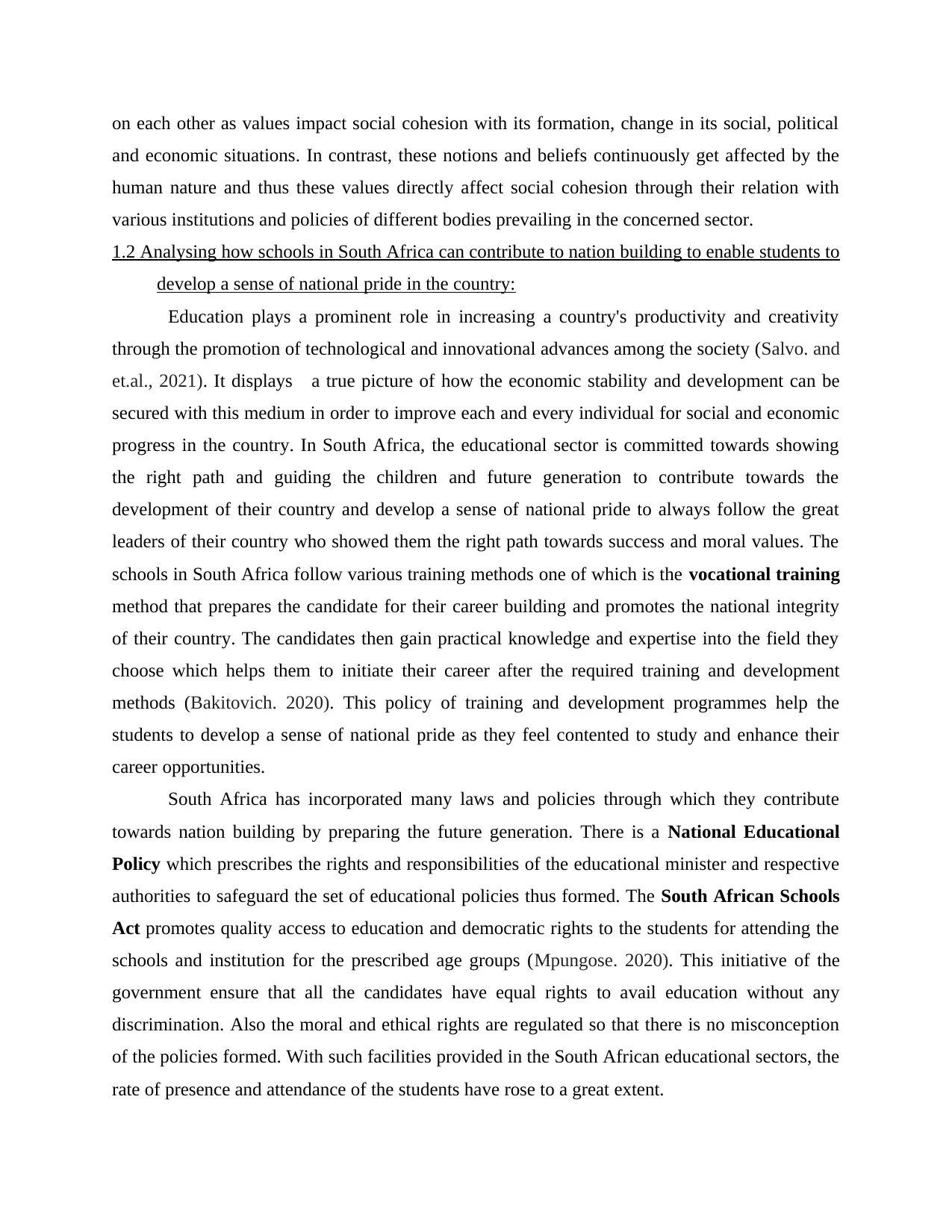
on each other as values impact social cohesion with its formation, change in its social, political
and economic situations. In contrast, these notions and beliefs continuously get affected by the
human nature and thus these values directly affect social cohesion through their relation with
various institutions and policies of different bodies prevailing in the concerned sector.
1.2 Analysing how schools in South Africa can contribute to nation building to enable students to
develop a sense of national pride in the country:
Education plays a prominent role in increasing a country's productivity and creativity
through the promotion of technological and innovational advances among the society (Salvo. and
et.al., 2021). It displays a true picture of how the economic stability and development can be
secured with this medium in order to improve each and every individual for social and economic
progress in the country. In South Africa, the educational sector is committed towards showing
the right path and guiding the children and future generation to contribute towards the
development of their country and develop a sense of national pride to always follow the great
leaders of their country who showed them the right path towards success and moral values. The
schools in South Africa follow various training methods one of which is the vocational training
method that prepares the candidate for their career building and promotes the national integrity
of their country. The candidates then gain practical knowledge and expertise into the field they
choose which helps them to initiate their career after the required training and development
methods (Bakitovich. 2020). This policy of training and development programmes help the
students to develop a sense of national pride as they feel contented to study and enhance their
career opportunities.
South Africa has incorporated many laws and policies through which they contribute
towards nation building by preparing the future generation. There is a National Educational
Policy which prescribes the rights and responsibilities of the educational minister and respective
authorities to safeguard the set of educational policies thus formed. The South African Schools
Act promotes quality access to education and democratic rights to the students for attending the
schools and institution for the prescribed age groups (Mpungose. 2020). This initiative of the
government ensure that all the candidates have equal rights to avail education without any
discrimination. Also the moral and ethical rights are regulated so that there is no misconception
of the policies formed. With such facilities provided in the South African educational sectors, the
rate of presence and attendance of the students have rose to a great extent.
and economic situations. In contrast, these notions and beliefs continuously get affected by the
human nature and thus these values directly affect social cohesion through their relation with
various institutions and policies of different bodies prevailing in the concerned sector.
1.2 Analysing how schools in South Africa can contribute to nation building to enable students to
develop a sense of national pride in the country:
Education plays a prominent role in increasing a country's productivity and creativity
through the promotion of technological and innovational advances among the society (Salvo. and
et.al., 2021). It displays a true picture of how the economic stability and development can be
secured with this medium in order to improve each and every individual for social and economic
progress in the country. In South Africa, the educational sector is committed towards showing
the right path and guiding the children and future generation to contribute towards the
development of their country and develop a sense of national pride to always follow the great
leaders of their country who showed them the right path towards success and moral values. The
schools in South Africa follow various training methods one of which is the vocational training
method that prepares the candidate for their career building and promotes the national integrity
of their country. The candidates then gain practical knowledge and expertise into the field they
choose which helps them to initiate their career after the required training and development
methods (Bakitovich. 2020). This policy of training and development programmes help the
students to develop a sense of national pride as they feel contented to study and enhance their
career opportunities.
South Africa has incorporated many laws and policies through which they contribute
towards nation building by preparing the future generation. There is a National Educational
Policy which prescribes the rights and responsibilities of the educational minister and respective
authorities to safeguard the set of educational policies thus formed. The South African Schools
Act promotes quality access to education and democratic rights to the students for attending the
schools and institution for the prescribed age groups (Mpungose. 2020). This initiative of the
government ensure that all the candidates have equal rights to avail education without any
discrimination. Also the moral and ethical rights are regulated so that there is no misconception
of the policies formed. With such facilities provided in the South African educational sectors, the
rate of presence and attendance of the students have rose to a great extent.
Paraphrase This Document
Need a fresh take? Get an instant paraphrase of this document with our AI Paraphraser
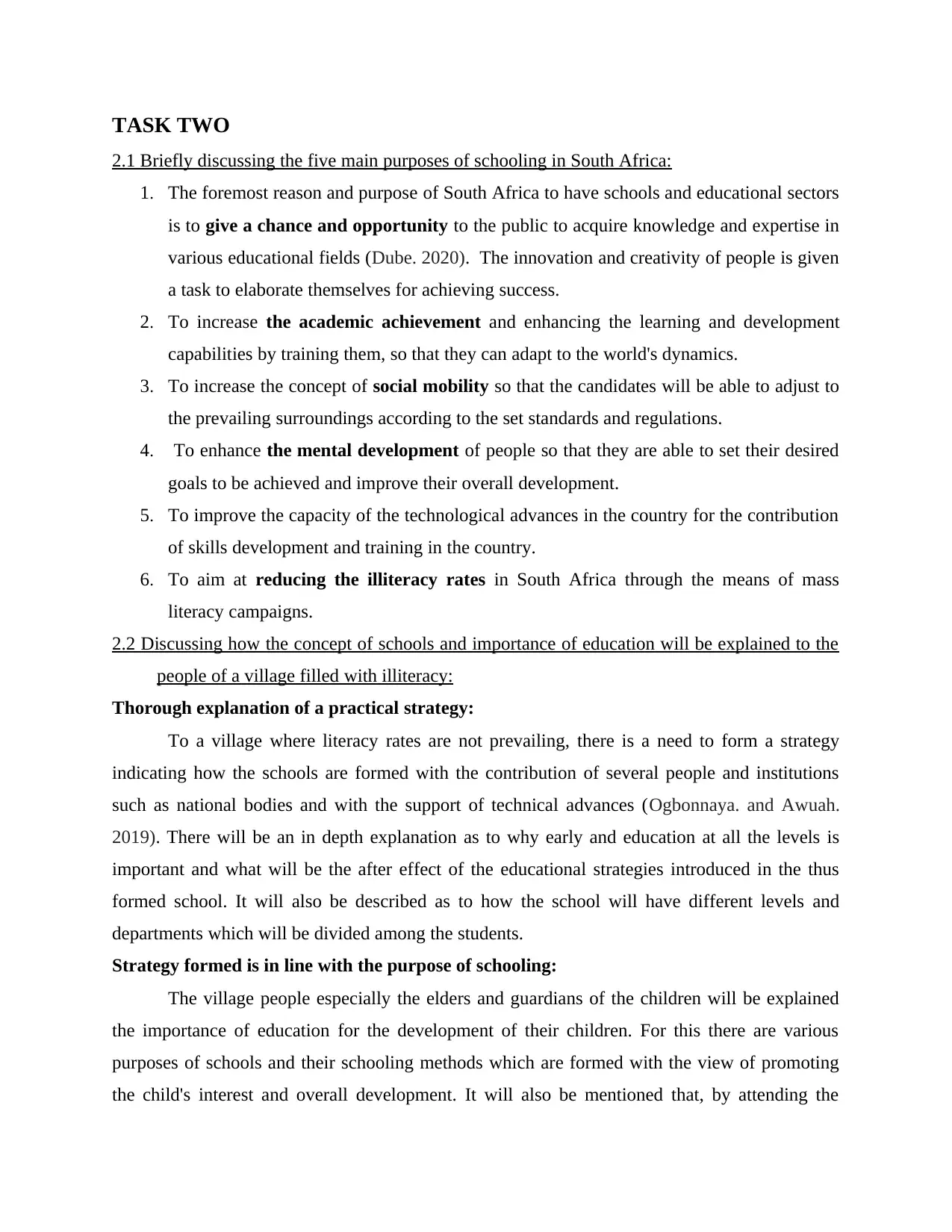
TASK TWO
2.1 Briefly discussing the five main purposes of schooling in South Africa:
1. The foremost reason and purpose of South Africa to have schools and educational sectors
is to give a chance and opportunity to the public to acquire knowledge and expertise in
various educational fields (Dube. 2020). The innovation and creativity of people is given
a task to elaborate themselves for achieving success.
2. To increase the academic achievement and enhancing the learning and development
capabilities by training them, so that they can adapt to the world's dynamics.
3. To increase the concept of social mobility so that the candidates will be able to adjust to
the prevailing surroundings according to the set standards and regulations.
4. To enhance the mental development of people so that they are able to set their desired
goals to be achieved and improve their overall development.
5. To improve the capacity of the technological advances in the country for the contribution
of skills development and training in the country.
6. To aim at reducing the illiteracy rates in South Africa through the means of mass
literacy campaigns.
2.2 Discussing how the concept of schools and importance of education will be explained to the
people of a village filled with illiteracy:
Thorough explanation of a practical strategy:
To a village where literacy rates are not prevailing, there is a need to form a strategy
indicating how the schools are formed with the contribution of several people and institutions
such as national bodies and with the support of technical advances (Ogbonnaya. and Awuah.
2019). There will be an in depth explanation as to why early and education at all the levels is
important and what will be the after effect of the educational strategies introduced in the thus
formed school. It will also be described as to how the school will have different levels and
departments which will be divided among the students.
Strategy formed is in line with the purpose of schooling:
The village people especially the elders and guardians of the children will be explained
the importance of education for the development of their children. For this there are various
purposes of schools and their schooling methods which are formed with the view of promoting
the child's interest and overall development. It will also be mentioned that, by attending the
2.1 Briefly discussing the five main purposes of schooling in South Africa:
1. The foremost reason and purpose of South Africa to have schools and educational sectors
is to give a chance and opportunity to the public to acquire knowledge and expertise in
various educational fields (Dube. 2020). The innovation and creativity of people is given
a task to elaborate themselves for achieving success.
2. To increase the academic achievement and enhancing the learning and development
capabilities by training them, so that they can adapt to the world's dynamics.
3. To increase the concept of social mobility so that the candidates will be able to adjust to
the prevailing surroundings according to the set standards and regulations.
4. To enhance the mental development of people so that they are able to set their desired
goals to be achieved and improve their overall development.
5. To improve the capacity of the technological advances in the country for the contribution
of skills development and training in the country.
6. To aim at reducing the illiteracy rates in South Africa through the means of mass
literacy campaigns.
2.2 Discussing how the concept of schools and importance of education will be explained to the
people of a village filled with illiteracy:
Thorough explanation of a practical strategy:
To a village where literacy rates are not prevailing, there is a need to form a strategy
indicating how the schools are formed with the contribution of several people and institutions
such as national bodies and with the support of technical advances (Ogbonnaya. and Awuah.
2019). There will be an in depth explanation as to why early and education at all the levels is
important and what will be the after effect of the educational strategies introduced in the thus
formed school. It will also be described as to how the school will have different levels and
departments which will be divided among the students.
Strategy formed is in line with the purpose of schooling:
The village people especially the elders and guardians of the children will be explained
the importance of education for the development of their children. For this there are various
purposes of schools and their schooling methods which are formed with the view of promoting
the child's interest and overall development. It will also be mentioned that, by attending the
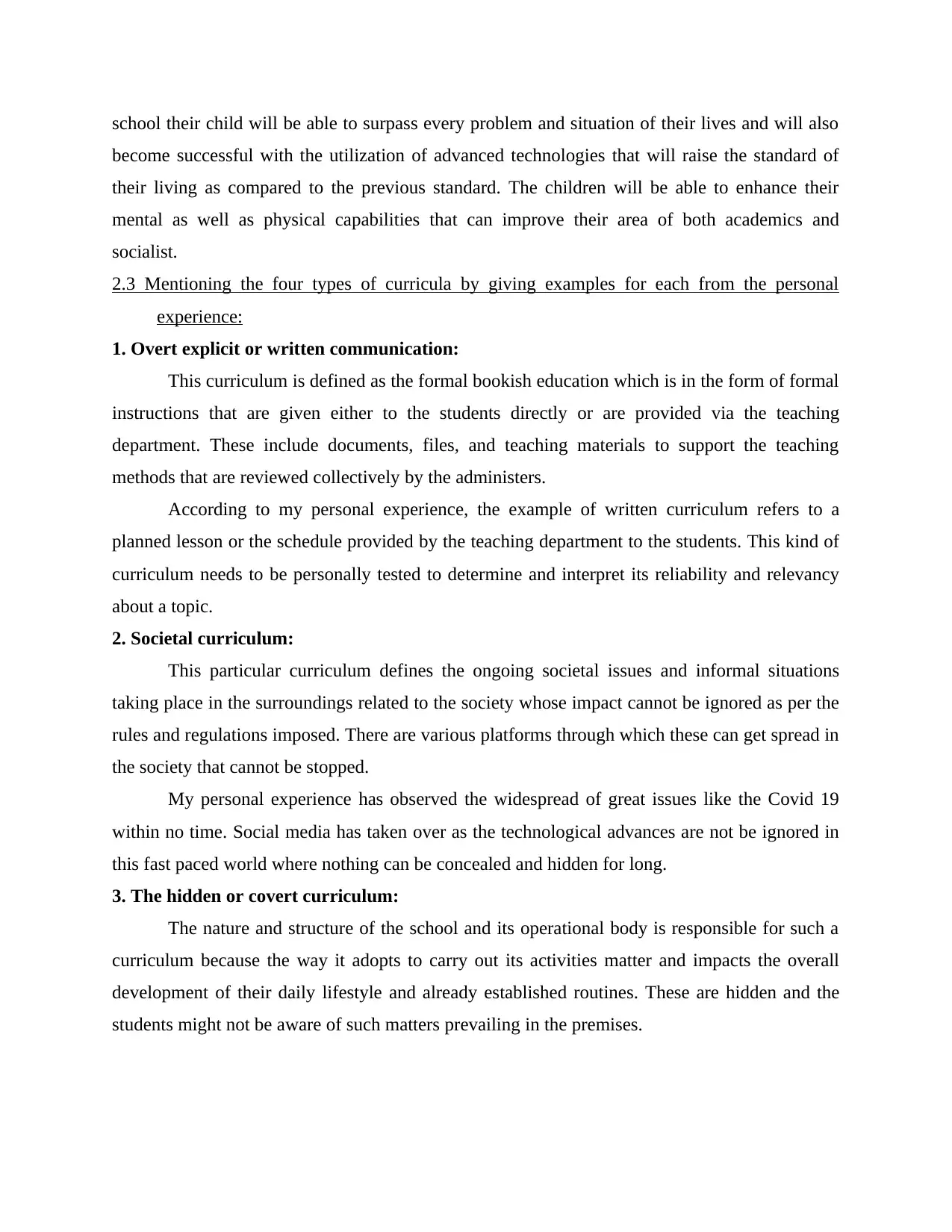
school their child will be able to surpass every problem and situation of their lives and will also
become successful with the utilization of advanced technologies that will raise the standard of
their living as compared to the previous standard. The children will be able to enhance their
mental as well as physical capabilities that can improve their area of both academics and
socialist.
2.3 Mentioning the four types of curricula by giving examples for each from the personal
experience:
1. Overt explicit or written communication:
This curriculum is defined as the formal bookish education which is in the form of formal
instructions that are given either to the students directly or are provided via the teaching
department. These include documents, files, and teaching materials to support the teaching
methods that are reviewed collectively by the administers.
According to my personal experience, the example of written curriculum refers to a
planned lesson or the schedule provided by the teaching department to the students. This kind of
curriculum needs to be personally tested to determine and interpret its reliability and relevancy
about a topic.
2. Societal curriculum:
This particular curriculum defines the ongoing societal issues and informal situations
taking place in the surroundings related to the society whose impact cannot be ignored as per the
rules and regulations imposed. There are various platforms through which these can get spread in
the society that cannot be stopped.
My personal experience has observed the widespread of great issues like the Covid 19
within no time. Social media has taken over as the technological advances are not be ignored in
this fast paced world where nothing can be concealed and hidden for long.
3. The hidden or covert curriculum:
The nature and structure of the school and its operational body is responsible for such a
curriculum because the way it adopts to carry out its activities matter and impacts the overall
development of their daily lifestyle and already established routines. These are hidden and the
students might not be aware of such matters prevailing in the premises.
become successful with the utilization of advanced technologies that will raise the standard of
their living as compared to the previous standard. The children will be able to enhance their
mental as well as physical capabilities that can improve their area of both academics and
socialist.
2.3 Mentioning the four types of curricula by giving examples for each from the personal
experience:
1. Overt explicit or written communication:
This curriculum is defined as the formal bookish education which is in the form of formal
instructions that are given either to the students directly or are provided via the teaching
department. These include documents, files, and teaching materials to support the teaching
methods that are reviewed collectively by the administers.
According to my personal experience, the example of written curriculum refers to a
planned lesson or the schedule provided by the teaching department to the students. This kind of
curriculum needs to be personally tested to determine and interpret its reliability and relevancy
about a topic.
2. Societal curriculum:
This particular curriculum defines the ongoing societal issues and informal situations
taking place in the surroundings related to the society whose impact cannot be ignored as per the
rules and regulations imposed. There are various platforms through which these can get spread in
the society that cannot be stopped.
My personal experience has observed the widespread of great issues like the Covid 19
within no time. Social media has taken over as the technological advances are not be ignored in
this fast paced world where nothing can be concealed and hidden for long.
3. The hidden or covert curriculum:
The nature and structure of the school and its operational body is responsible for such a
curriculum because the way it adopts to carry out its activities matter and impacts the overall
development of their daily lifestyle and already established routines. These are hidden and the
students might not be aware of such matters prevailing in the premises.
⊘ This is a preview!⊘
Do you want full access?
Subscribe today to unlock all pages.

Trusted by 1+ million students worldwide
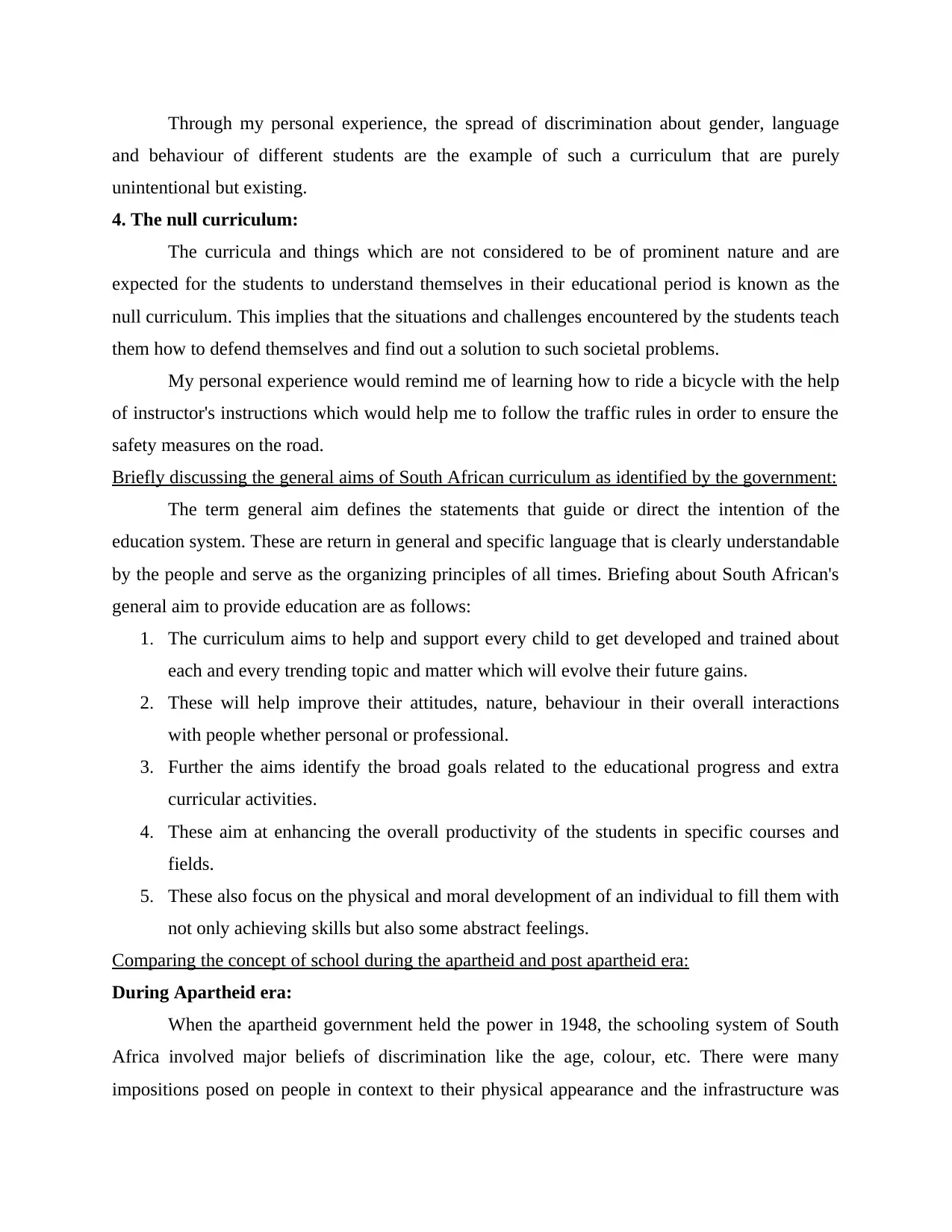
Through my personal experience, the spread of discrimination about gender, language
and behaviour of different students are the example of such a curriculum that are purely
unintentional but existing.
4. The null curriculum:
The curricula and things which are not considered to be of prominent nature and are
expected for the students to understand themselves in their educational period is known as the
null curriculum. This implies that the situations and challenges encountered by the students teach
them how to defend themselves and find out a solution to such societal problems.
My personal experience would remind me of learning how to ride a bicycle with the help
of instructor's instructions which would help me to follow the traffic rules in order to ensure the
safety measures on the road.
Briefly discussing the general aims of South African curriculum as identified by the government:
The term general aim defines the statements that guide or direct the intention of the
education system. These are return in general and specific language that is clearly understandable
by the people and serve as the organizing principles of all times. Briefing about South African's
general aim to provide education are as follows:
1. The curriculum aims to help and support every child to get developed and trained about
each and every trending topic and matter which will evolve their future gains.
2. These will help improve their attitudes, nature, behaviour in their overall interactions
with people whether personal or professional.
3. Further the aims identify the broad goals related to the educational progress and extra
curricular activities.
4. These aim at enhancing the overall productivity of the students in specific courses and
fields.
5. These also focus on the physical and moral development of an individual to fill them with
not only achieving skills but also some abstract feelings.
Comparing the concept of school during the apartheid and post apartheid era:
During Apartheid era:
When the apartheid government held the power in 1948, the schooling system of South
Africa involved major beliefs of discrimination like the age, colour, etc. There were many
impositions posed on people in context to their physical appearance and the infrastructure was
and behaviour of different students are the example of such a curriculum that are purely
unintentional but existing.
4. The null curriculum:
The curricula and things which are not considered to be of prominent nature and are
expected for the students to understand themselves in their educational period is known as the
null curriculum. This implies that the situations and challenges encountered by the students teach
them how to defend themselves and find out a solution to such societal problems.
My personal experience would remind me of learning how to ride a bicycle with the help
of instructor's instructions which would help me to follow the traffic rules in order to ensure the
safety measures on the road.
Briefly discussing the general aims of South African curriculum as identified by the government:
The term general aim defines the statements that guide or direct the intention of the
education system. These are return in general and specific language that is clearly understandable
by the people and serve as the organizing principles of all times. Briefing about South African's
general aim to provide education are as follows:
1. The curriculum aims to help and support every child to get developed and trained about
each and every trending topic and matter which will evolve their future gains.
2. These will help improve their attitudes, nature, behaviour in their overall interactions
with people whether personal or professional.
3. Further the aims identify the broad goals related to the educational progress and extra
curricular activities.
4. These aim at enhancing the overall productivity of the students in specific courses and
fields.
5. These also focus on the physical and moral development of an individual to fill them with
not only achieving skills but also some abstract feelings.
Comparing the concept of school during the apartheid and post apartheid era:
During Apartheid era:
When the apartheid government held the power in 1948, the schooling system of South
Africa involved major beliefs of discrimination like the age, colour, etc. There were many
impositions posed on people in context to their physical appearance and the infrastructure was
Paraphrase This Document
Need a fresh take? Get an instant paraphrase of this document with our AI Paraphraser
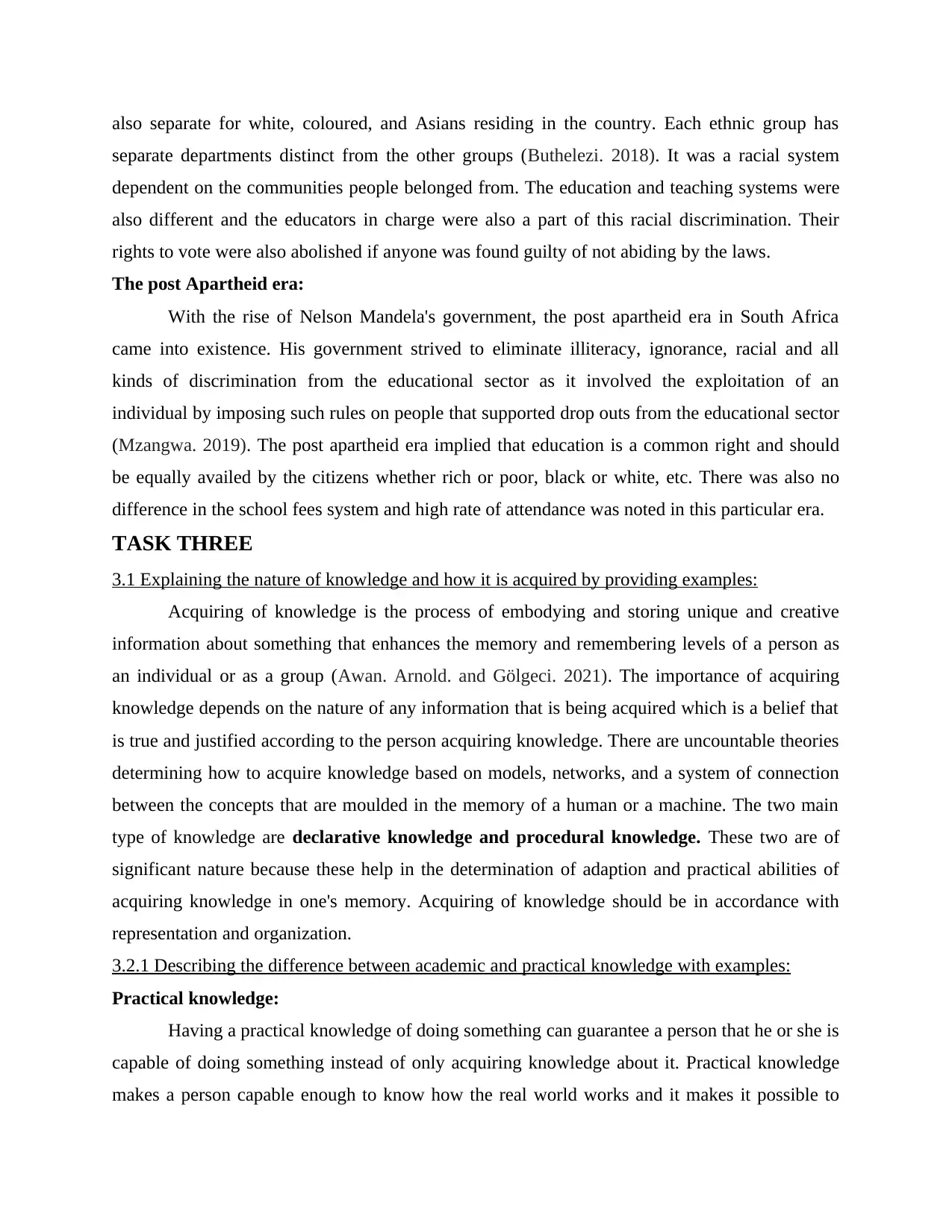
also separate for white, coloured, and Asians residing in the country. Each ethnic group has
separate departments distinct from the other groups (Buthelezi. 2018). It was a racial system
dependent on the communities people belonged from. The education and teaching systems were
also different and the educators in charge were also a part of this racial discrimination. Their
rights to vote were also abolished if anyone was found guilty of not abiding by the laws.
The post Apartheid era:
With the rise of Nelson Mandela's government, the post apartheid era in South Africa
came into existence. His government strived to eliminate illiteracy, ignorance, racial and all
kinds of discrimination from the educational sector as it involved the exploitation of an
individual by imposing such rules on people that supported drop outs from the educational sector
(Mzangwa. 2019). The post apartheid era implied that education is a common right and should
be equally availed by the citizens whether rich or poor, black or white, etc. There was also no
difference in the school fees system and high rate of attendance was noted in this particular era.
TASK THREE
3.1 Explaining the nature of knowledge and how it is acquired by providing examples:
Acquiring of knowledge is the process of embodying and storing unique and creative
information about something that enhances the memory and remembering levels of a person as
an individual or as a group (Awan. Arnold. and Gölgeci. 2021). The importance of acquiring
knowledge depends on the nature of any information that is being acquired which is a belief that
is true and justified according to the person acquiring knowledge. There are uncountable theories
determining how to acquire knowledge based on models, networks, and a system of connection
between the concepts that are moulded in the memory of a human or a machine. The two main
type of knowledge are declarative knowledge and procedural knowledge. These two are of
significant nature because these help in the determination of adaption and practical abilities of
acquiring knowledge in one's memory. Acquiring of knowledge should be in accordance with
representation and organization.
3.2.1 Describing the difference between academic and practical knowledge with examples:
Practical knowledge:
Having a practical knowledge of doing something can guarantee a person that he or she is
capable of doing something instead of only acquiring knowledge about it. Practical knowledge
makes a person capable enough to know how the real world works and it makes it possible to
separate departments distinct from the other groups (Buthelezi. 2018). It was a racial system
dependent on the communities people belonged from. The education and teaching systems were
also different and the educators in charge were also a part of this racial discrimination. Their
rights to vote were also abolished if anyone was found guilty of not abiding by the laws.
The post Apartheid era:
With the rise of Nelson Mandela's government, the post apartheid era in South Africa
came into existence. His government strived to eliminate illiteracy, ignorance, racial and all
kinds of discrimination from the educational sector as it involved the exploitation of an
individual by imposing such rules on people that supported drop outs from the educational sector
(Mzangwa. 2019). The post apartheid era implied that education is a common right and should
be equally availed by the citizens whether rich or poor, black or white, etc. There was also no
difference in the school fees system and high rate of attendance was noted in this particular era.
TASK THREE
3.1 Explaining the nature of knowledge and how it is acquired by providing examples:
Acquiring of knowledge is the process of embodying and storing unique and creative
information about something that enhances the memory and remembering levels of a person as
an individual or as a group (Awan. Arnold. and Gölgeci. 2021). The importance of acquiring
knowledge depends on the nature of any information that is being acquired which is a belief that
is true and justified according to the person acquiring knowledge. There are uncountable theories
determining how to acquire knowledge based on models, networks, and a system of connection
between the concepts that are moulded in the memory of a human or a machine. The two main
type of knowledge are declarative knowledge and procedural knowledge. These two are of
significant nature because these help in the determination of adaption and practical abilities of
acquiring knowledge in one's memory. Acquiring of knowledge should be in accordance with
representation and organization.
3.2.1 Describing the difference between academic and practical knowledge with examples:
Practical knowledge:
Having a practical knowledge of doing something can guarantee a person that he or she is
capable of doing something instead of only acquiring knowledge about it. Practical knowledge
makes a person capable enough to know how the real world works and it makes it possible to
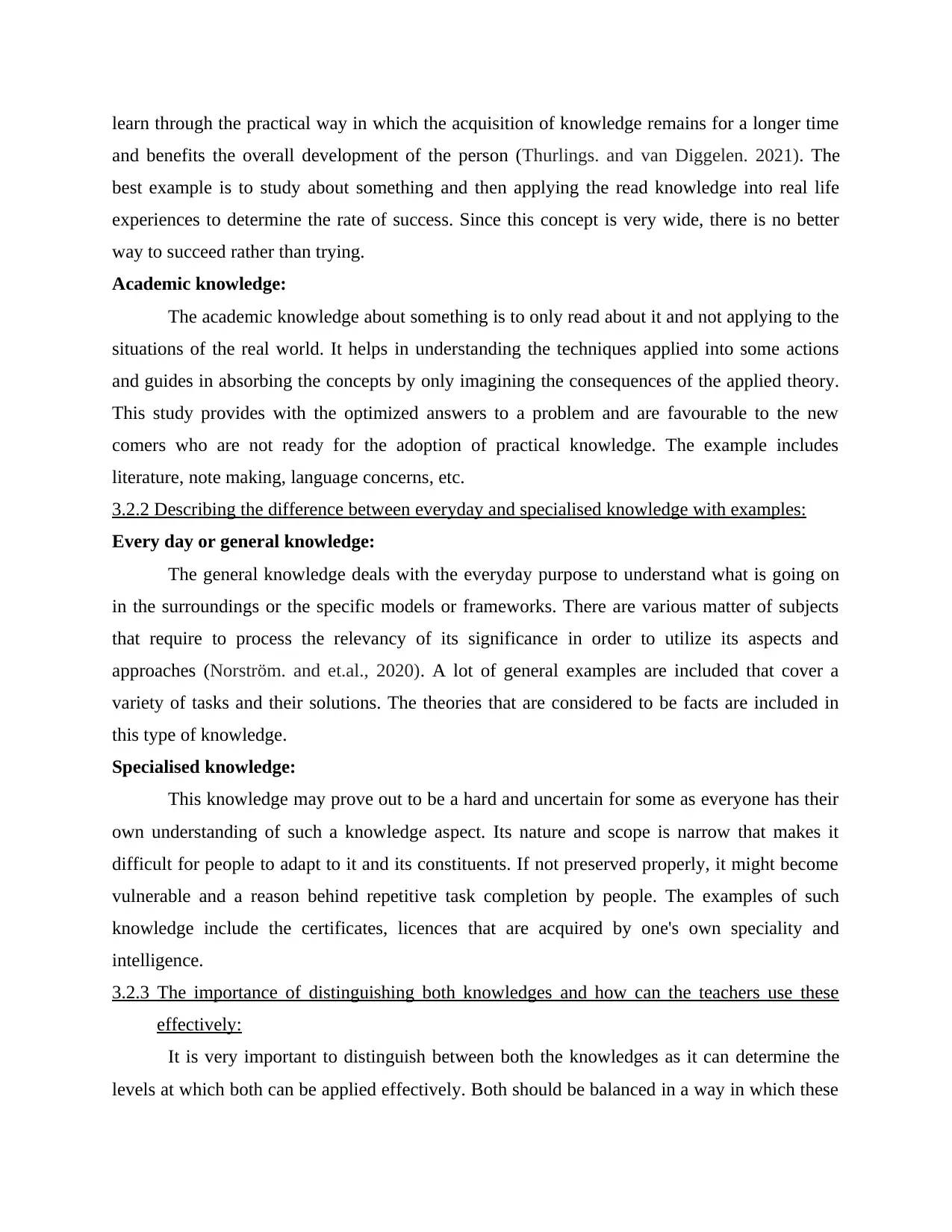
learn through the practical way in which the acquisition of knowledge remains for a longer time
and benefits the overall development of the person (Thurlings. and van Diggelen. 2021). The
best example is to study about something and then applying the read knowledge into real life
experiences to determine the rate of success. Since this concept is very wide, there is no better
way to succeed rather than trying.
Academic knowledge:
The academic knowledge about something is to only read about it and not applying to the
situations of the real world. It helps in understanding the techniques applied into some actions
and guides in absorbing the concepts by only imagining the consequences of the applied theory.
This study provides with the optimized answers to a problem and are favourable to the new
comers who are not ready for the adoption of practical knowledge. The example includes
literature, note making, language concerns, etc.
3.2.2 Describing the difference between everyday and specialised knowledge with examples:
Every day or general knowledge:
The general knowledge deals with the everyday purpose to understand what is going on
in the surroundings or the specific models or frameworks. There are various matter of subjects
that require to process the relevancy of its significance in order to utilize its aspects and
approaches (Norström. and et.al., 2020). A lot of general examples are included that cover a
variety of tasks and their solutions. The theories that are considered to be facts are included in
this type of knowledge.
Specialised knowledge:
This knowledge may prove out to be a hard and uncertain for some as everyone has their
own understanding of such a knowledge aspect. Its nature and scope is narrow that makes it
difficult for people to adapt to it and its constituents. If not preserved properly, it might become
vulnerable and a reason behind repetitive task completion by people. The examples of such
knowledge include the certificates, licences that are acquired by one's own speciality and
intelligence.
3.2.3 The importance of distinguishing both knowledges and how can the teachers use these
effectively:
It is very important to distinguish between both the knowledges as it can determine the
levels at which both can be applied effectively. Both should be balanced in a way in which these
and benefits the overall development of the person (Thurlings. and van Diggelen. 2021). The
best example is to study about something and then applying the read knowledge into real life
experiences to determine the rate of success. Since this concept is very wide, there is no better
way to succeed rather than trying.
Academic knowledge:
The academic knowledge about something is to only read about it and not applying to the
situations of the real world. It helps in understanding the techniques applied into some actions
and guides in absorbing the concepts by only imagining the consequences of the applied theory.
This study provides with the optimized answers to a problem and are favourable to the new
comers who are not ready for the adoption of practical knowledge. The example includes
literature, note making, language concerns, etc.
3.2.2 Describing the difference between everyday and specialised knowledge with examples:
Every day or general knowledge:
The general knowledge deals with the everyday purpose to understand what is going on
in the surroundings or the specific models or frameworks. There are various matter of subjects
that require to process the relevancy of its significance in order to utilize its aspects and
approaches (Norström. and et.al., 2020). A lot of general examples are included that cover a
variety of tasks and their solutions. The theories that are considered to be facts are included in
this type of knowledge.
Specialised knowledge:
This knowledge may prove out to be a hard and uncertain for some as everyone has their
own understanding of such a knowledge aspect. Its nature and scope is narrow that makes it
difficult for people to adapt to it and its constituents. If not preserved properly, it might become
vulnerable and a reason behind repetitive task completion by people. The examples of such
knowledge include the certificates, licences that are acquired by one's own speciality and
intelligence.
3.2.3 The importance of distinguishing both knowledges and how can the teachers use these
effectively:
It is very important to distinguish between both the knowledges as it can determine the
levels at which both can be applied effectively. Both should be balanced in a way in which these
⊘ This is a preview!⊘
Do you want full access?
Subscribe today to unlock all pages.

Trusted by 1+ million students worldwide
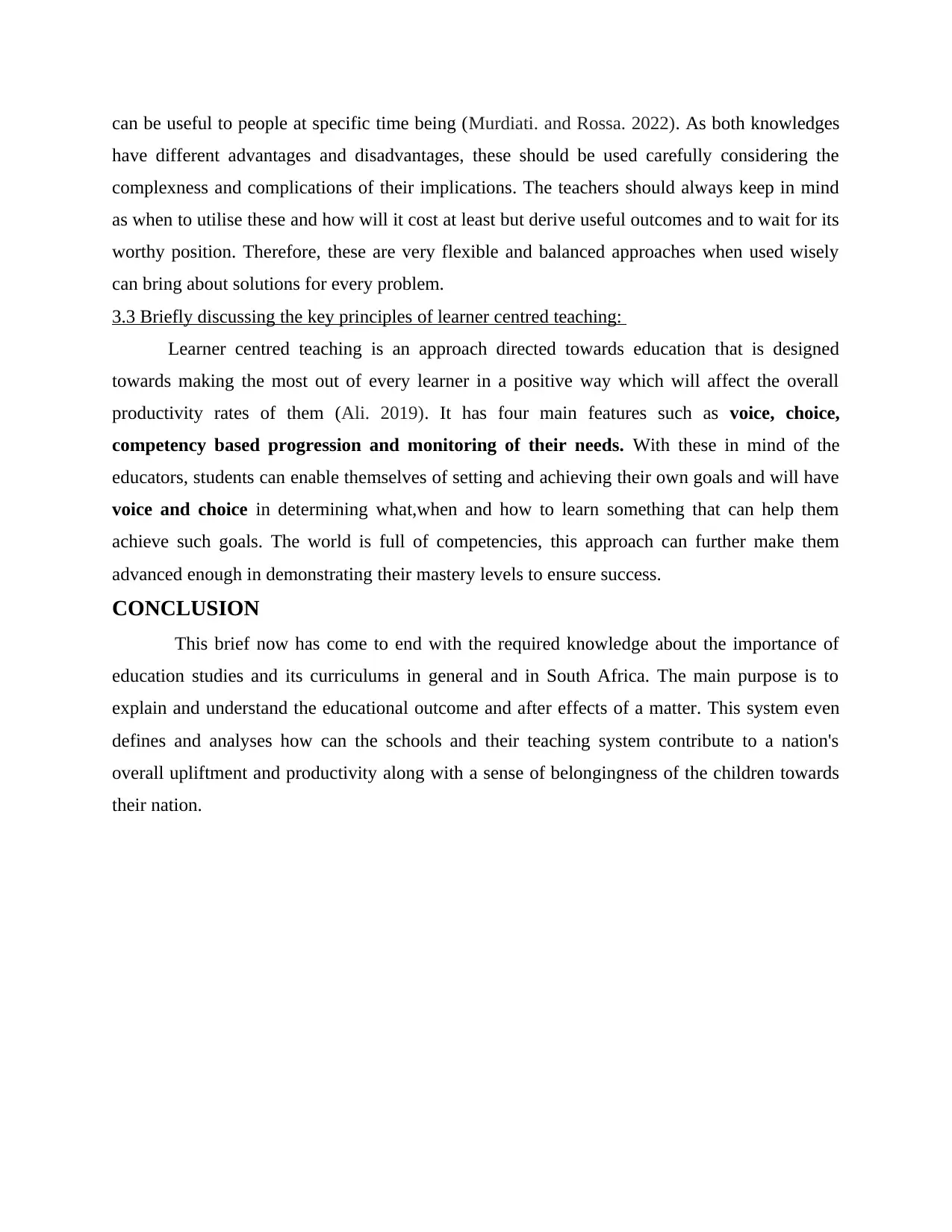
can be useful to people at specific time being (Murdiati. and Rossa. 2022). As both knowledges
have different advantages and disadvantages, these should be used carefully considering the
complexness and complications of their implications. The teachers should always keep in mind
as when to utilise these and how will it cost at least but derive useful outcomes and to wait for its
worthy position. Therefore, these are very flexible and balanced approaches when used wisely
can bring about solutions for every problem.
3.3 Briefly discussing the key principles of learner centred teaching:
Learner centred teaching is an approach directed towards education that is designed
towards making the most out of every learner in a positive way which will affect the overall
productivity rates of them (Ali. 2019). It has four main features such as voice, choice,
competency based progression and monitoring of their needs. With these in mind of the
educators, students can enable themselves of setting and achieving their own goals and will have
voice and choice in determining what,when and how to learn something that can help them
achieve such goals. The world is full of competencies, this approach can further make them
advanced enough in demonstrating their mastery levels to ensure success.
CONCLUSION
This brief now has come to end with the required knowledge about the importance of
education studies and its curriculums in general and in South Africa. The main purpose is to
explain and understand the educational outcome and after effects of a matter. This system even
defines and analyses how can the schools and their teaching system contribute to a nation's
overall upliftment and productivity along with a sense of belongingness of the children towards
their nation.
have different advantages and disadvantages, these should be used carefully considering the
complexness and complications of their implications. The teachers should always keep in mind
as when to utilise these and how will it cost at least but derive useful outcomes and to wait for its
worthy position. Therefore, these are very flexible and balanced approaches when used wisely
can bring about solutions for every problem.
3.3 Briefly discussing the key principles of learner centred teaching:
Learner centred teaching is an approach directed towards education that is designed
towards making the most out of every learner in a positive way which will affect the overall
productivity rates of them (Ali. 2019). It has four main features such as voice, choice,
competency based progression and monitoring of their needs. With these in mind of the
educators, students can enable themselves of setting and achieving their own goals and will have
voice and choice in determining what,when and how to learn something that can help them
achieve such goals. The world is full of competencies, this approach can further make them
advanced enough in demonstrating their mastery levels to ensure success.
CONCLUSION
This brief now has come to end with the required knowledge about the importance of
education studies and its curriculums in general and in South Africa. The main purpose is to
explain and understand the educational outcome and after effects of a matter. This system even
defines and analyses how can the schools and their teaching system contribute to a nation's
overall upliftment and productivity along with a sense of belongingness of the children towards
their nation.
Paraphrase This Document
Need a fresh take? Get an instant paraphrase of this document with our AI Paraphraser

REFERENCES
Books and Journals
Ali, S. S., 2019. Problem based learning: A student-centered approach. English language
teaching. 12(5). pp.73-78.
Awan, U., Arnold, M. G. and Gölgeci, I., 2021. Enhancing green product and process
innovation: Towards an integrative framework of knowledge acquisition and
environmental investment. Business Strategy and the Environment. 30(2). pp.1283-1295.
Bakitovich, A. E., 2020. Improvement of technologies of ecological education of pupils. Asian
Journal of Multidimensional Research (AJMR). 9(6). pp.165-171.
Breidahl, K. N., Holtug, N. and Kongshøj, K., 2018. Do shared values promote social cohesion?
If so, which? Evidence from Denmark. European Political Science Review. 10(1). pp.97-
118.
Buthelezi, Z., 2018. Lecturer experiences of TVET College challenges in the post-apartheid era:
a case of unintended consequences of educational reform in South Africa. Journal of
Vocational Education & Training. 70(3). pp.364-383.
Dube, B., 2020. Rural online learning in the context of COVID 19 in South Africa: Evoking an
inclusive education approach. REMIE: Multidisciplinary Journal of Educational
Research. 10(2). pp.135-157.
Guzmán-Valenzuela, C. and Gómez, C., 2019. Advancing a knowledge ecology: Changing
patterns of higher education studies in Latin America. Higher Education. 77(1). pp.115-
133.
Healy, M., 2019. Belonging, social cohesion and fundamental British values. British Journal of
Educational Studies. 67(4). pp.423-438.
Mpungose, C. B., 2020. Emergent transition from face-to-face to online learning in a South
African University in the context of the Coronavirus pandemic. Humanities and Social
Sciences Communications. 7(1). pp.1-9.
Murdiati, D. and Rossa, M. A., 2022. DIFFERENCE BETWEEN KNOWLEDGE AND
SCIENCE. The Social Perspective Journal. 1(3). pp.218-227.
Mzangwa, S. T., 2019. The effects of higher education policy on transformation in post-apartheid
South Africa. Cogent Education. 6(1). p.1592737.
Norström, A. V. and et.al., 2020. Principles for knowledge co-production in sustainability
research. Nature sustainability. 3(3). pp.182-190.
Ogbonnaya, U. I. and Awuah, F. K., 2019. QUINTILE RANKING OF SCHOOLS IN SOUTH
AFRICA AND LEARNERS’ACHIEVEMENT IN PROBABILITY. Statistics Education
Research Journal. 18(1). pp.106-119.
Salvo, D. and et.al., 2021. Physical activity promotion and the United Nations Sustainable
Development Goals: building synergies to maximize impact. Journal of Physical Activity
and Health. 18(10). pp.1163-1180.
Thurlings, M. and van Diggelen, M., 2021. Perceptions of practical knowledge of learning and
feedback among academic teachers. European Journal of Engineering Education. 46(1).
pp.139-160.
Online
. 2022. [Online]. Available through: <>
Books and Journals
Ali, S. S., 2019. Problem based learning: A student-centered approach. English language
teaching. 12(5). pp.73-78.
Awan, U., Arnold, M. G. and Gölgeci, I., 2021. Enhancing green product and process
innovation: Towards an integrative framework of knowledge acquisition and
environmental investment. Business Strategy and the Environment. 30(2). pp.1283-1295.
Bakitovich, A. E., 2020. Improvement of technologies of ecological education of pupils. Asian
Journal of Multidimensional Research (AJMR). 9(6). pp.165-171.
Breidahl, K. N., Holtug, N. and Kongshøj, K., 2018. Do shared values promote social cohesion?
If so, which? Evidence from Denmark. European Political Science Review. 10(1). pp.97-
118.
Buthelezi, Z., 2018. Lecturer experiences of TVET College challenges in the post-apartheid era:
a case of unintended consequences of educational reform in South Africa. Journal of
Vocational Education & Training. 70(3). pp.364-383.
Dube, B., 2020. Rural online learning in the context of COVID 19 in South Africa: Evoking an
inclusive education approach. REMIE: Multidisciplinary Journal of Educational
Research. 10(2). pp.135-157.
Guzmán-Valenzuela, C. and Gómez, C., 2019. Advancing a knowledge ecology: Changing
patterns of higher education studies in Latin America. Higher Education. 77(1). pp.115-
133.
Healy, M., 2019. Belonging, social cohesion and fundamental British values. British Journal of
Educational Studies. 67(4). pp.423-438.
Mpungose, C. B., 2020. Emergent transition from face-to-face to online learning in a South
African University in the context of the Coronavirus pandemic. Humanities and Social
Sciences Communications. 7(1). pp.1-9.
Murdiati, D. and Rossa, M. A., 2022. DIFFERENCE BETWEEN KNOWLEDGE AND
SCIENCE. The Social Perspective Journal. 1(3). pp.218-227.
Mzangwa, S. T., 2019. The effects of higher education policy on transformation in post-apartheid
South Africa. Cogent Education. 6(1). p.1592737.
Norström, A. V. and et.al., 2020. Principles for knowledge co-production in sustainability
research. Nature sustainability. 3(3). pp.182-190.
Ogbonnaya, U. I. and Awuah, F. K., 2019. QUINTILE RANKING OF SCHOOLS IN SOUTH
AFRICA AND LEARNERS’ACHIEVEMENT IN PROBABILITY. Statistics Education
Research Journal. 18(1). pp.106-119.
Salvo, D. and et.al., 2021. Physical activity promotion and the United Nations Sustainable
Development Goals: building synergies to maximize impact. Journal of Physical Activity
and Health. 18(10). pp.1163-1180.
Thurlings, M. and van Diggelen, M., 2021. Perceptions of practical knowledge of learning and
feedback among academic teachers. European Journal of Engineering Education. 46(1).
pp.139-160.
Online
. 2022. [Online]. Available through: <>
1 out of 11
Your All-in-One AI-Powered Toolkit for Academic Success.
+13062052269
info@desklib.com
Available 24*7 on WhatsApp / Email
![[object Object]](/_next/static/media/star-bottom.7253800d.svg)
Unlock your academic potential
Copyright © 2020–2025 A2Z Services. All Rights Reserved. Developed and managed by ZUCOL.

